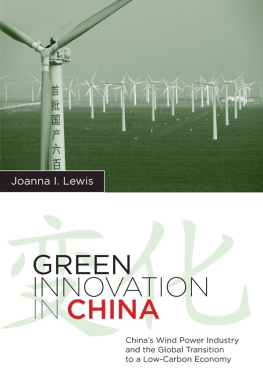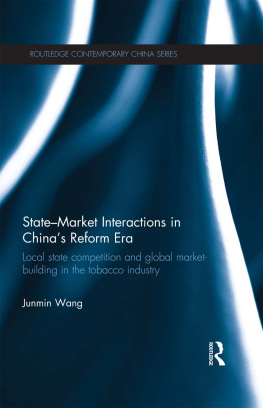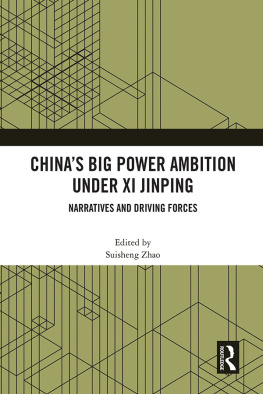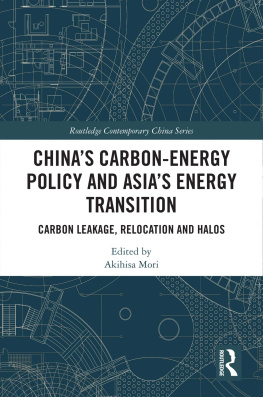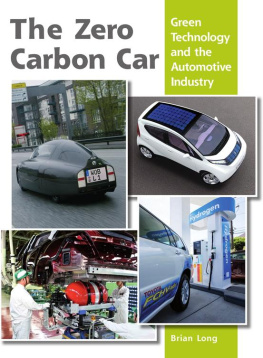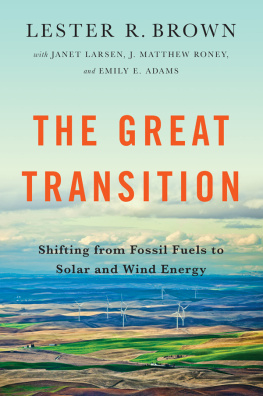Green Innovation in China
Contemporary Asia in the World
Contemporary Asia in the World
David C. Kang and Victor D. Cha, Editors
This series aims to address a gap in the public-policy and scholarly discussion of Asia. It seeks to promote books and studies that are on the cutting edge of their respective disciplines or in the promotion of multidisciplinary or interdisciplinary research but that are also accessible to a wider readership. The editors seek to showcase the best scholarly and public-policy arguments on Asia from any field, including politics, history, economics, and cultural studies.
Beyond the Final Score: The Politics of Sport in Asia, Victor D. Cha, 2008
The Power of the Internet in China: Citizen Activism Online, Guobin Yang, 2009
China and India: Prospects for Peace, Jonathan Holslag, 2010
India, Pakistan, and the Bomb: Debating Nuclear Stability in South Asia, umit Ganguly and S. Paul Kapur, 2010
Living with the Dragon: How the American Public Views the Rise of China, Benjamin I. Page and Tao Xie, 2010
East Asia Before the West: Five Centuries of Trade and Tribute, David C. Kang, 2010
Harmony and War: Confucian Culture and Chinese Power Politics, Yuan-Kang Wang, 2011
Strong Society, Smart State: The Rise of Public Opinion in Chinas Japan Policy, James Reilly, 2012
Asias Space Race: National Motivations, Regional Rivalries, and International Risks, James Clay Moltz, 2012
Never Forget National Humiliation: Historical Memory in Chinese Politics and Foreign Relations, Zheng Wang, 2012
GREEN
INNOVATION
IN CHINA
Chinas Wind Power Industry and the Global Transition to a Low-Carbon Economy
Joanna I. Lewis
Columbia University Press

New York
Columbia University Press
Publishers Since 1893
New York Chichester, West Sussex
cup.columbia.edu
Copyright 2013 Joanna I. Lewis
All rights reserved
E-ISBN 978-0-231-52687-6
Library of Congress Cataloging-in-Publication Data
Lewis, Joanna I.
Green innovation in China : Chinas wind power industry and the global transition to a low-carbon economy / Joanna I. Lewis.
p. cm.(Contemporary Asia in the world)
Includes bibliographical references and index.
ISBN 978-0-231-15330-0 (cloth : alk. paper)ISBN 978-0-231-52687-6 (electronic) 1. Wind power industryChina. 2. Wind power industryTechnological innovations. 3. Electric power productionTechnology transferChina. I. Title.
HD9502.5.W553L49 2013
333.9'20951dc23
2011051915
A Columbia University Press E-book.
CUP would be pleased to hear about your reading experience with this e-book at .
Jacket design: Rebecca Lown Design
Jacket image: Dabancheng Wind Farm Bob Sacha/Corbis
References to Internet Web sites (URLs) were accurate at the time of writing. Neither the author nor Columbia University Press is responsible for URLs that may have expired or changed since the manuscript was prepared.
Contents
When I first began examining Chinas strategies for clean energy development in the late 1990s, I discovered that although wind power appeared to have excellent potential for near-term utilization in China, little was happening in the way of wind power development. Since then I have witnessed a major change in the attention Chinese policy makers give to wind power development. The policy regime to promote renewable resources, and wind power in particular, has changed significantly with the introduction of several major policies to support wind energy development. As a result, over the past decade China has transitioned from a country with only a handful of wind turbines to the largest wind power market in the world.
This marked change has unsurprisingly caught the attention of wind energy technology companies from around the world. In 2001, when I conducted my preliminary survey of the wind turbine manufacturing companies that were active in the Chinese market, I assumed this would turn into a study of the failed attempts of technology transfers that appeared prevalent in the handful of Sino-foreign joint ventures that constituted the industry, as well as of why no Chinese manufacturers had been able to come up with a commercially viable wind turbine technology design.
But by the time I moved to China in fall 2003, the wind turbine market there was already beginning to look quite different. What had appeared to be a stagnant market in the late 1990s and early 2000s had witnessed the entrance of several new, dynamic participants, including Goldwind, the first successful domestic turbine manufacturer, and GE, the first multinational corporation to enter the wind energy businessboth drawn to the new policy regime and potential of the Chinese market. It soon became evident that this research would include not just an examination of technology transfer models used by firms to bring wind turbines to China but also a study of the role of multinational firms and domestic Chinese companies in clean energy innovation and deployment throughout the world.
Research for this book was conducted from 2001 to 2010. Interviews were conducted in China (primarily Beijing but also Shanghai, Nanao, Shantou, Guangzhou, Baoding, Hohhot, and Xining) and Washington, D.C., over this period, as well as in Austin (at the 2003 American Wind Energy Association conference); Denver (at the 2004 World Renewable Energy Congress); and New Delhi and Seoul (2010 and 2011). Additional interviews took place at the United Nations climate change negotiations in Bonn (20052007); Montreal (2005); Nairobi (2006), Bali (2007); Poznan (2008); Copenhagen (2009); and Tianjin (2010). Several positions and professional relationships facilitated my access to stakeholders in Chinas wind power industry. My initial introduction to many energy policy makers in China was a result of my employment with the China Energy Group of the U.S. Department of Energys Lawrence Berkeley National Laboratory from 2000 to 2005 while enrolled as a graduate student in Energy and Resources at UC Berkeley. Since 2001 I have also worked with the Energy Foundation China Sustainable Energy Program on renewable energy issues. During the 200304 academic year Tsinghua University in Beijing hosted me as a senior visiting scholar while I was conducting dissertation research. During that year I also worked informally with several Beijing-based organizations involved in wind energy and climate change issues, including BJADC and Green Capital. From 2005 to 2011 I made several trips per year to China to conduct research for this project, often in conjunction with my work for the Pew Center on Global Climate Change, the Energy Foundation China Sustainable Energy Program, the Asia Society, and the U.S. National Academies.
My interview subjects fall into three broad categories: government officials working on energy and climate policy (particularly wind energy policy); My research also relies heavily on government documents (such as laws, regulations, notices, and press releases) and company information (such as annual reports, press releases, industry studies, and media interviews). No proprietary industry information or other confidential information is included in this study.
There are known problems with data reliability in China that can make research there challenging. In the specific area of Chinas reported national energy statistics, researchers have studied trends in official data and systematic inaccuracies in an attempt to quantify and characterize their nature and magnitude. Politically sensitive aspects of energy and climate change issues in China can lead to further problems with data reliability that could limit the accuracy of information collected and therefore the effectiveness of the research. Whenever possible I have attempted to validate data by cross-referencing data points across multiple sources and multiple interview subjects. When there are inherent uncertainties with some of the information presented, I have tried to characterize the nature of this uncertainty.
 New York
New York

